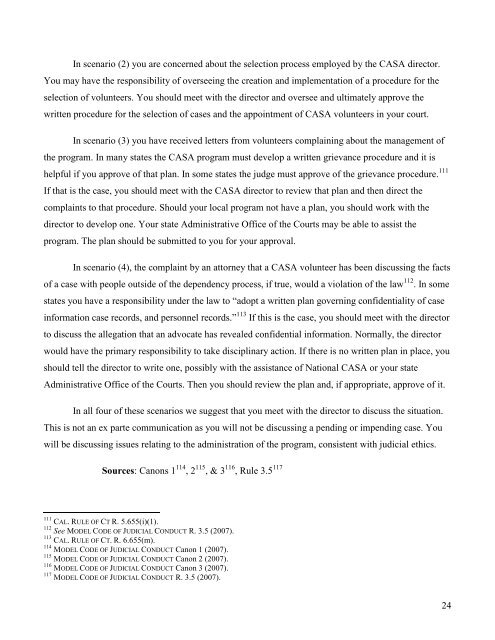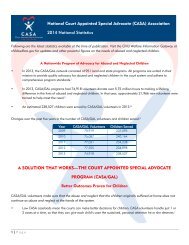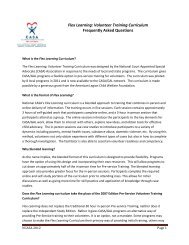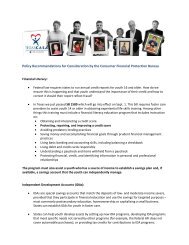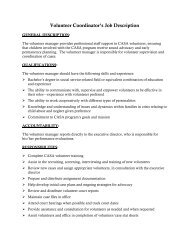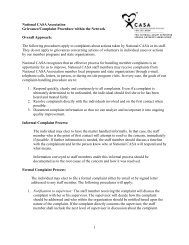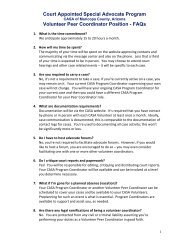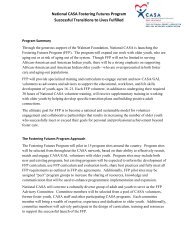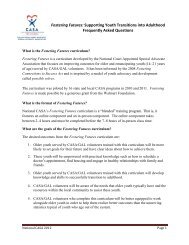CASA Programs and Judicial Ethics Introduction - National CASA
CASA Programs and Judicial Ethics Introduction - National CASA
CASA Programs and Judicial Ethics Introduction - National CASA
Create successful ePaper yourself
Turn your PDF publications into a flip-book with our unique Google optimized e-Paper software.
In scenario (2) you are concerned about the selection process employed by the <strong>CASA</strong> director.You may have the responsibility of overseeing the creation <strong>and</strong> implementation of a procedure for theselection of volunteers. You should meet with the director <strong>and</strong> oversee <strong>and</strong> ultimately approve thewritten procedure for the selection of cases <strong>and</strong> the appointment of <strong>CASA</strong> volunteers in your court.In scenario (3) you have received letters from volunteers complaining about the management ofthe program. In many states the <strong>CASA</strong> program must develop a written grievance procedure <strong>and</strong> it ishelpful if you approve of that plan. In some states the judge must approve of the grievance procedure. 111If that is the case, you should meet with the <strong>CASA</strong> director to review that plan <strong>and</strong> then direct thecomplaints to that procedure. Should your local program not have a plan, you should work with thedirector to develop one. Your state Administrative Office of the Courts may be able to assist theprogram. The plan should be submitted to you for your approval.In scenario (4), the complaint by an attorney that a <strong>CASA</strong> volunteer has been discussing the factsof a case with people outside of the dependency process, if true, would a violation of the law 112 . In somestates you have a responsibility under the law to “adopt a written plan governing confidentiality of caseinformation case records, <strong>and</strong> personnel records.” 113 If this is the case, you should meet with the directorto discuss the allegation that an advocate has revealed confidential information. Normally, the directorwould have the primary responsibility to take disciplinary action. If there is no written plan in place, youshould tell the director to write one, possibly with the assistance of <strong>National</strong> <strong>CASA</strong> or your stateAdministrative Office of the Courts. Then you should review the plan <strong>and</strong>, if appropriate, approve of it.In all four of these scenarios we suggest that you meet with the director to discuss the situation.This is not an ex parte communication as you will not be discussing a pending or impending case. Youwill be discussing issues relating to the administration of the program, consistent with judicial ethics.Sources: Canons 1 114 , 2 115 , & 3 116 , Rule 3.5 117111 CAL. RULE OF CT R. 5.655(i)(1).112 See MODEL CODE OF JUDICIAL CONDUCT R. 3.5 (2007).113 CAL. RULE OF CT. R. 6.655(m).114 MODEL CODE OF JUDICIAL CONDUCT Canon 1 (2007).115 MODEL CODE OF JUDICIAL CONDUCT Canon 2 (2007).116 MODEL CODE OF JUDICIAL CONDUCT Canon 3 (2007).117 MODEL CODE OF JUDICIAL CONDUCT R. 3.5 (2007).24


